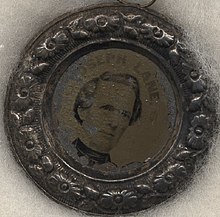Joseph Lane
In the 1860 United States presidential election, Lane was nominated for vice president of the pro-slavery Southern wing of the Democratic Party, as John C. Breckinridge's running mate.
Lane's pro-slavery views and sympathy for the Confederate States of America in the Civil War effectively ended his political career in Oregon.
Joseph Lane was born in Buncombe County, North Carolina, on December 14, 1801, to a family of English extraction with roots in colonial Virginia.
[2] During the daytime, he worked and saved his money, investing it shortly in the purchase of a flatboat, with which he transported freight up and down the Ohio River.
[2] Lane was an eloquent public speaker, a talent that helped him to win election to the Indiana House of Representatives in 1822 at the age of just 21.
[1] Lane and the Indiana troops were then deployed to Mexico where he fought with distinction, suffering two minor gunshot wounds, and was brevetted to major general in 1847.
[1] He commanded the Indiana Brigade at the Battle of Buena Vista, where he served under General and future President Zachary Taylor.
[1] Lane also led the relief force which lifted the Siege of Puebla, defeating Antonio López de Santa Anna at the Battle of Huamantla.
In 1853, after he was re-elected as Delegate, but before he left for Washington, D.C., Lane was appointed as brigadier general commanding a force of volunteers raised to suppress recent Native American violence.
[1] Lane was also an active participant in the so-called Rogue River Wars of 1855–1856,[1] being wounded in the shoulder at the Battle of Evans Creek.
[1] He later purchased a 2,000-acre (810 ha) ranch located about 11 miles (18 km) east of that town, which he owned for a number of years before selling to a son.
[1] Although openly sympathetic to the Confederate cause, he remained home on his ranch; he did not participate in the war, nor did he make a return to politics after that date.
[1] He has been accused of keeping a personal slave as late as 1878, an assumption based on the race of the African-Indian orphan, named Peter Waldo, he raised from the age of two to seventeen.
General Lane's daughter's home in Roseburg, where he spent much of his time, is now a museum maintained by the Douglas County Historical Society.


